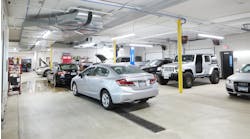Should you listen to your service advisor? Should you listen to part-timers who help you keep the shop looking great? How often should you talk with them?
Working with shop owners for more than four decades has taught me a lot about running a business. In the past 10 years, I have seen more change in our industry than in the previous 30 years. We have been forced to learn many new skills, and believe me when I tell you I hate change. I was listening to a shop owner from Nebraska, Rick Johnson, explain how to keep your business growing. He also is a coach at ATI and has taught this successfully to hundreds of shop owners.
Rick said he has a good friend whose son is an airline pilot. One day she was telling him about something her son talked to her about. He had told her about “situational awareness.” It is simply the ability to see objects in time and space through multiple perspectives and interpretations. Simple, huh? He put it to her like this: “Mom, even though we have all these wonderful instruments that tell us how fast we are going, how high we are flying, how much fuel we have and how well things are running, it is still important to look out the window once in a while and see for ourselves just how things are looking.”
Situational awareness involves being aware of what is happening in the vicinity in order to understand how information, events and one’s own actions will affect goals and objectives, both immediately and in the near future. One with an adept sense of situational awareness generally has a high degree of knowledge about the inputs and outputs of a system, i.e., an instinctive “feel” for people and events — for the situations that play out due to variables the subject can control. Another definition is “the perception of elements in the environment within a volume of time and space, the comprehension of their meaning and the projection of their status in the near future.” And probably my most favorite, “Knowing what is going on so you can figure out what to do.”
Increasing Productivity
So how does all this apply to your shop? After all, we are not flying high-tech airplanes here — or are we? I have always been told that a service writer is much like an air traffic controller. The advisor handles all the traffic coming into the shop and all the traffic leaving the shop, watches for collisions of time constraints, promised delivery times and parts ordering, and keeps track of the techs’ needs as well. The techs keep this well-oiled machine cranking out all the production, and the owner (pilot) needs to fly this ship and watch for any hazards and fly around them as they come up. When the shop has good communication from the control tower to the techs and the owner, things can fly along pretty smoothly. However, when something breaks down, it is amazing and scary how fast we can crash and burn.
We, like the airplane pilot, definitely have a lot of “wonderful instruments” to monitor our business. At ATI we call them Key Performance Indicators (KPIs). We can see average repair order, parts margins, labor margins, car count, gross profit and many other indicators of how fast we are going, how high we are flying and how much fuel we have. So, like the pilot, do we need to just watch the gauges, or do we need to “look out the window” and practice situational awareness as well?
Situational awareness applies not only to high-tech equipment, but also to people. We must apply this to our staff as well as to our equipment. It is important for us, as pilots of our businesses, to take a look around, not to focus only on the instruments or KPIs, but to become aware of our environments as well. After all, it is our employees that make our instruments run and reports come to life. How long has it been since you have taken the time and effort to meet with your staff? To take their “temperatures” and see how they are running? To see how fast they are going and how much fuel they have left?
Don’t Forget
In today’s fast-paced shop and high-tech world, it is pretty easy to forget that we are working with some of the most important equipment in our shops and that is our employees. Taking time to meet with them has almost become a forgotten skill in most shops. I realize that production is important, but what good does it do to run so hard that we forget to stay aware of our employees’ KPIs? Paying attention to our employees is easier than you might think and takes very little time, and the results are amazing.
A great way to do this is to set up one-on-one meetings weekly with each employee. Take time to set up a notebook and list the employee’s strengths and weaknesses and go over it with them to come up with a battle plan of how to help them work on the things that need to improve, to equip them to be successful. And give them honest feedback on the things that are going well. And celebrate with them when a weakness becomes a strength!
It is a good idea to use this notebook to list the strengths and weaknesses of the pilot as well! What are your strengths? What areas do you need to work on? Develop a plan to work on those weaknesses so that you can make them strengths. Same applies to the shop building and equipment. Think of it as a “pre-flight checklist,” something you use every week before you take off for the flights you will be making every day.
Increasing Tenure
Interacting in this way can help ensure that the business runs smoothly, and that most crashes can be averted. I have talked to a lot of techs who say that they feel like they are no more than a cog in the wheel and their opinions do not matter. These are the techs that suddenly and seemingly without warning give two weeks’ notice and are gone, and we never knew there was a problem. Maybe if we had taken the time to be aware of their situation, perhaps with one-on-one weekly meetings, we would have given them the platform to give us a heads-up concerning a problem that we could have done something about. I would sure like to think so. I have also talked to a lot of techs who love their jobs and feel that their opinions do matter, who do get a chance to meet with management or ownership so that their voice is heard.
Nothing can ground a flight faster than one or two key members of the crew leaving and then having to be replaced. We have all heard that attitude controls our altitude. And I believe that with constant and methodical situational awareness, we can all reach new heights with our businesses.
We do have a very good document that you can request that will guide you in setting up and facilitating these meetings and help you “look out the window,” simply go to www.ationlinetraining.com/2013-7.
Subscribe to Motor Age and receive articles like this every month…absolutely free. Click here



